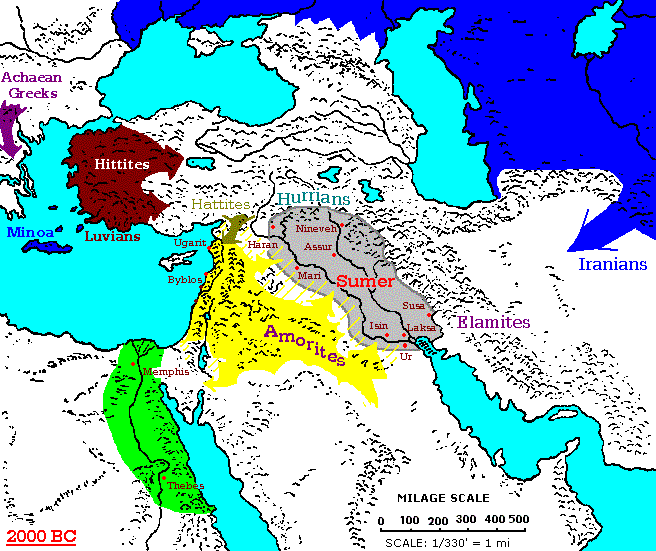Prepare Ye the Way
2000 - 1900 BC, the Middle East

2000 - 1900 BC, the Middle East
The ancient world in 2000 BC basked in the calm before the storm. Egypt, where the pyramids were already five centuries old, was recovering from a period of internal weakness during which it had retired to its desert-sheltered Nile. It would soon establish its Second Kingdom.
Mesopotamia was a unified land, the last flowering of Sumer under the kings of the Third Dynasty of Ur. Its civilization was already 1500 years old, its people worldly and cosmopolitan. Commerce was important because the land, particularly the south, lacked resources of metal and other materials. Trade and caravan routes existed, binding the area together and making it possible to travel anywhere in the land of Ur or beyond. (Still, the scale is small to modern eyes. Great cities like Memphis, Susa and Ur probably had populations of 10-15,000.)
The idyl was short-lived. The Amorites, a nomadic group of Semites, had been increasing in number and infiltrating beyond their traditional desert homeland for nearly 200 years. (One group of Amorites near Haran may have been ancestral to the Arameans.) To the north a non-Semitic group, the Hurrians, had also expanded from the mountains into upper Mesopotamia. With pressure from nomads and Elamites, with soil salted and cropped out, Ur was losing its hold on the kingdom.
Abraham appears in the Bible in the context of the breakup of the last Sumerian kingdom. He is described as coming from Ur "of the Chaldees" (the Chaldees controlled Ur at the times Genesis was being put in writing). He lived for a time in Haran, a town in the far north of the Mesopotamian area, which may have been founded by Ur as a trading colony. This is the area henceforth regarded as the ancient homeland by the Patriarchs, whose relatives remained there after Abraham left. Many of the towns of the area bear the names of ancestors of Abraham: Nahor, Til-Turakhi (Terah), Sarugi (Serug), and others. Contact with Haran was maintained for many years, and wives would be brought from Haran for Abrahamís son and grandson.
Posted by John  Read more
Read more  Comments (15)
Comments (15) ![]() 17.01.
17.01.